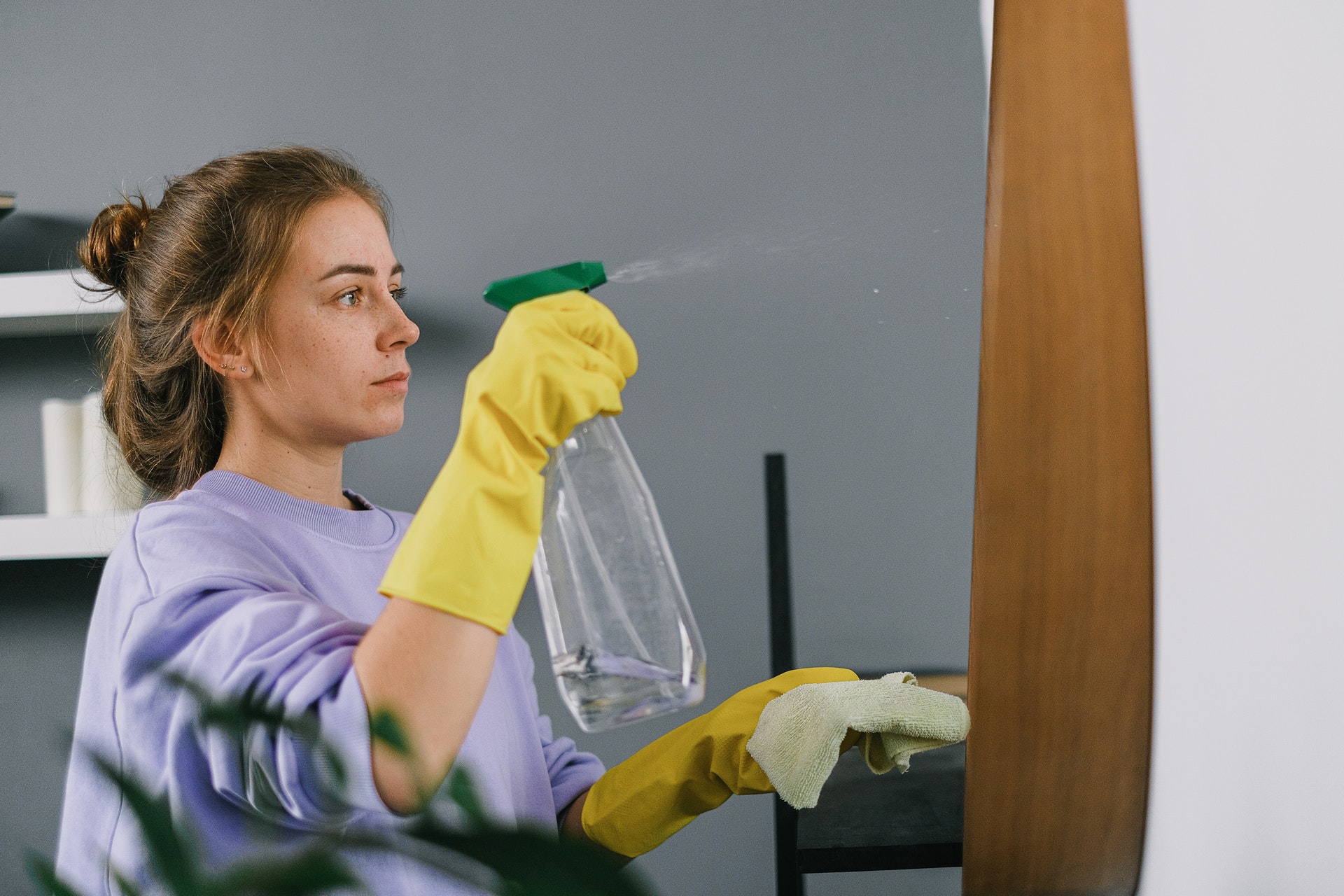The cleaning industry is one of the fastest-growing industries in Canada. This is because demands for maintaining sanitization to stop the spread of potentially dangerous germs are going up. Meaning that people are heavily relying on keeping spaces clean to not only ensure the safety of themselves and their families, but to keep their businesses open and a roof over their heads. Cleaners are truly becoming the new superheroes of the world.

How to Start a Cleaning Business
What is a Self-Employed Cleaner?
A self-employed cleaner works for themselves (either alone or with employees working under them), providing cleaning services to individuals or organizations. For example, they could work in a private home, office space, clinic, hotels – any space (indoor or outdoor) that needs cleaning.
There are many different names for self-employed cleaners depending on the duties they provide, including, maid service or janitorial services. Typically, the services offered in a residential cleaning business are:
- Sanitizing surfaces
- Dusting
- Sweeping, vacuuming, and mopping floors
- Upholstery and carpet cleaning
- Cleaning dishes
- Organizing
- Changing bed linens
- Doing laundry
- Glass and window cleaning
- Folding clothes/fabrics
- Ironing clothes/fabrics
Medical and commercial cleaning business industries
Besides residential cleaning, your cleaning service can focus on a few other industries should you wish to try another avenue of business. Commercial cleaning services encompass the upkeep and cleaning of office buildings and other local businesses. Office cleaning responsibilities cover the emptying of wastebaskets, cleaning of floors, and sanitation of surfaces, bathrooms, and eating spaces within the office. Commercials cleaners typically work at night when the office is clear of workers.
At the same time, other cleaning services revolve around the medical industry. Medical cleaning, also known as terminal cleaning, focuses on the sanitation of various healthcare environments like hospitals, medical clinics, pharmacies, optometric clinics, veterinarian clinics, and dentistry clinics. The primary responsibilities of healthcare sanitation and medical cleaners would be to:
- Sweep, vacuum, and mop the floors
- Change the linens of hospital beds and inpatient rooms
- Disinfect and sterilize medical utensils and apparatuses
- Disinfect and sterilize hospital surfaces, including exam rooms, tables, patient rooms, and surgery rooms
- Safely dispose of biohazard waste such as used needles, medical utensils, other
Benefits of Running a Successful Cleaning Business
Self-employed cleaners enjoy the perks of any self-employed workers – and then some. Here is a list of benefits when establishing yourself as a self-employed cleaner.
Flexibility
Self-employed cleaners have the flexibility to work on their own schedule by choosing how many hours they work and when they work them. Also, clients can need cleaners at almost any time of the day and any day of the week, so there is no strict timeline you need to work around (unlike at a 9–5 where you must be in at very specific hours). This makes the job easy to plan around, creating a good work-life balance.
Cost-effective
The cost of starting and maintaining cleaning companies is relatively low. All you need to account for are the cleaning materials and the transportation to and from the locations. If your residential cleaning service uses your clients’ cleaning materials, you don’t even have to consider those costs.
High demand
The good news is that everything gets dirty, so there is no shortage of places to be cleaned. This is especially true for our current society as we are still adjusting to the COVID-19 pandemic and resulting sanitation requirements. People need to take extra precautions with keeping their areas sanitized, especially in schools, medical offices, and daycares.
Pay
How much is it to clean a house, you ask? The overall cleaning cost can earn you a pretty penny. Depending on the size of the home or office space, people can pay anywhere from $100-$300 for the job. If you clean multiple places a day, this could become quite lucrative.
9 Things to Consider When Starting a Cleaning Company
So now that you’re intrigued by the benefits of starting a cleaning company and are eager to jump in, we just need to remind you of a few things to consider.
1. Gain experience
You should be gaining experience – like in any other industry. If you have never cleaned professionally (and no, the dishes you did after dinner do not count, unfortunately), you should try joining a professional team before you start. This will give you an understanding of the speed you should be cleaning at, the problems that you may occur along the way, and the things that need cleaning that you might not have thought of.
2. Brand your business
A cleaning company is a business like no other. When you are a small business and no one is familiar with you yet, you need to make sure you stand out – do not underestimate the power of good branding and online marketing.
So, before you shell out for an expensive T.V commercial, you should start with things like a business name, business cards, and a website domain name. Make sure the name is memorable (maybe it’s funny or sounds catchy) so people think of it whenever they think of cleaning. In recent years, eco-friendly cleaning has gained popularity, so ensuring your cleaning chemicals and cleaning products are all environmentally friendly can help you build this brand.
On the same note, you will want to spend some effort and time focusing on social media marketing. Create some business profiles on various social media platforms and start posting about your business, as well as interesting and informative content that will get you noticed. You will also want to add your company details to any local business directories to make it easier for people to find you.
3. Build a budget
This should be fairly simple since the average cost to clean a house is quite low. Consider things like house cleaning prices, cost of cleaning supplies, specific cleaning equipment like vacuums and steam cleaners, how far you’re willing to travel to each location, extra clothing you need (since you probably don’t want to do the work in your regular clothes) when building a budget for your business model. There are also startup costs to opening up the cleaning business that you will need to note in the budget.
Your budget is a crucial aspect of your business plan. It will determine how much you might need to save before you even start your business and how much you will spend once it’s running.
4. Ensure coverage of all business licenses and requirements
Again, this is a business like no other, and you want to make sure you are doing things legitimately. You will need to follow through with a business registration to obtain a Business License. Since this will most likely be a limited liability company, rather than a sole proprietorship, the cost of the license should not be too high depending on your business structure. You will also need to register with the CRA for taxes and purchase insurance.
At the same time, whether you’re starting a residential or commercial cleaners, you will need to open a business bank account to keep your personal assets and company assets and liabilities separate. Having separate business accounts is especially important should you structure your business as a corporation.
5. Secure business insurance
Business insurance is always a good idea, no matter what type of small business you operate. Should you accidentally break a client’s priceless antique, you won’t want to have to pay out of pocket to replace the item. If you have general liability insurance, you will be protected against such expenses.
Using a car for work to get to your cleaning jobs can also warrant vehicle insurance coverage. This is especially important when operating a mobile business, should you get into any accidents while driving on the job. Business vehicle insurance also means you can deduct certain vehicle expenses from your business tax returns.
Over time, you may want to bundle your insurance should you expand your maid services and hire employees. If you have cleaning teams working for you, then securing workers’ compensation insurance is a must. Overall, insurance is an essential step in your business planning, so don’t forget to browse and secure coverage that works for your needs.
6. Assemble your equipment
Think about what supplies most cleaning companies use on a daily basis. Do you need to bring your own mop and bucket? Take a look at this article on essential cleaning supplies so you can obtain a better understanding of the different options available.
Overall, you will need to decide which basic cleaning solutions and chemicals you will need, and any other essential equipment when starting a cleaning business. Keep in mind that you may need different equipment and supplies depending on if you have commercial clients, residential clients, or medical clients.
7. Create a price guide for your cleaning services
Your house cleaning price guide allows you to quickly assess the amount of work you need to get done and how much to charge for it.
Invoices are a great way to ensure you and your client are happy with the arrangement, so no unexpected issues arise during the payment process. To professionally bill your clients, consider using this free invoice generating tool, so you can list out all services and supplies used to total the amount owed by each client.
You might also consider creating a pricing guide laid out like the cleaning pricing guide example below. Post this to your business website and social pages to make it easy for your potential clients to find and understand.
| PROPERTY SIZE | CLEANING TIME | AVERAGE COST |
|---|---|---|
| Apartment (<1000 sqft) | 2-3 hours | $150-$200 |
| 2-bed house (1000-1500 sqft) | 2-4 hours | $175-$225 |
| 3-4 bed house (1500-1800 sqft) | 3-5 hours | $200-$250 |
| 5-bed house (1800-2250 sqft) | 5-7 hours | $275-$325 |
| 6-bed house (2250-3000 sqft) | 5-8 hours | $300-$350 |
8. Network your business
You will probably be speaking to an older demographic, so make sure to adhere your marketing tactics to them. Think of different marketing strategies that will be appropriate for your target market. For example, since you may want to clean for business spaces, you can look into B2B strategies, and for private homes, a referral program will make sense.
A loyalty program is also a good idea here. A fact of life is that it is messy, and we need to clean often – meaning cleaning services are required regularly. Therefore, it could be a great incentive to tell potential customers they can get special perks if they hire you to clean for them regularly!
9. Determine how you will handle your finances
One of the final and most important steps in opening your own cleaning business is determining how you will manage your revenue, track sales tax and business expenses, and generate financial reports. Many small successful businesses today use accounting software to track their cash flow.
QuickBooks Self-Employed software lets you easily track mileage when driving to your various cleaning jobs, organize receipts of cleaning supplies, and create and track invoices to send to clients. It makes confirming that you stay on budget easy, and ensures profitability of your new business.
Handling the finances of your house cleaning business can seem like a daunting task, but QuickBooks makes it easy. Try this accounting software for free today!


